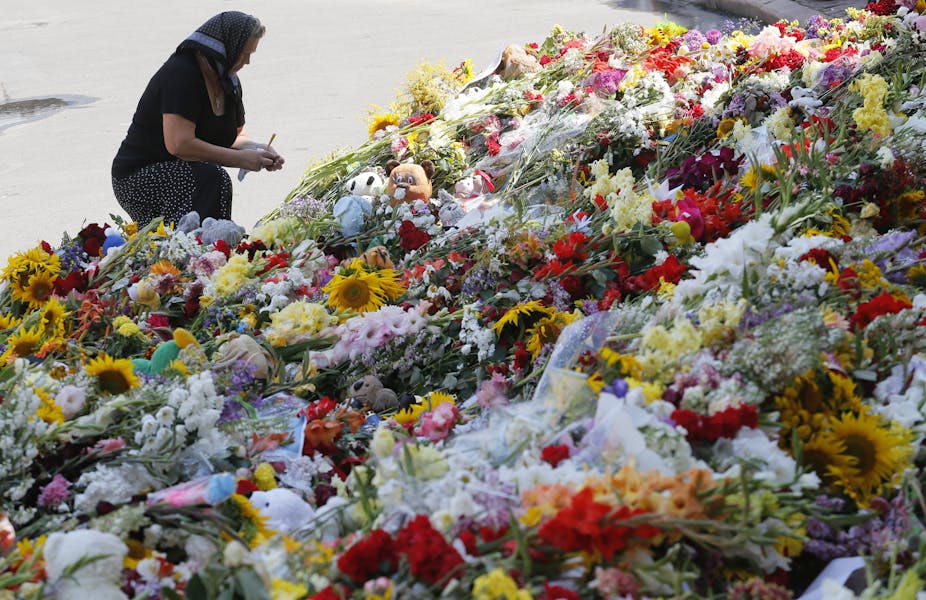The unanimous vote in the UN Security Council on the shooting down of Malaysia Airlines flight MH17 over rebel-controlled territory in eastern Ukraine is a welcome step. The resolution, drafted by Australia which lost 37 people in the tragedy, condemns the downing of the aircraft and calls for all states to co-operate with the investigation and demands that armed groups allow open access to the crash site.
But this unanimous vote, while giving cause for optimism, cannot disguise the fact that this is a tragedy on many levels. Most obviously for the victims and their relatives and friends who have suffered often unbearable losses. It is also a tragedy for Ukraine, for the West and for Russia, albeit to a large extent one of their own making.
The discussions ahead of, and after, the vote in the UN Security Council over the resolution illustrated that the renewed escalation of the crisis in Ukraine may not have been planned, but it was entirely predictable in light of the developments over recent months.
As the new Ukrainian government under President Poroshenko is trying to assert its authority over the restive provinces of Donetsk and Luhansk in the country’s east, it has become clear – yet again – that a military solution, if possible at all, will come at a huge cost. This cost is, first of all, measured in human lives lost – civilians, government forces, and rebels. But it is also a cost that, once the guns go silent, will be measured in economic terms for Ukraine and its international backers.
And there will be ever increasing social costs making it difficult to see how a country so deeply divided as Ukraine will be able to maintain and rebuild any kind of social cohesion for years to come.
At the same time, the complete lack of any constructive relationship between Russia and the West has contributed to the further escalation of the crisis. While it is difficult to imagine that Moscow deliberately facilitated the downing of MH17, its actions over the past several months have certainly contributed to putting rebels in a position that gave them the capabilities that resulted in last week’s disaster.
No meaningful de-escalation efforts by Moscow, Brussels, and Washington over the past few weeks, the failure to sustain a fledgling ceasefire on the ground and the inability of leaders in Russia and the West alike to draw back from bellicose rhetoric all played their part in a situation in which MH17 is a symptom of crisis management gone wrong.
Moscow’s role in the crisis since last year becomes more and more indefensible, and no relativism or “apportioning” of blame can cover up the fact that the Kremlin remains behind a deliberate destabilisation of Ukraine that involved the illegal annexation of Crimea, the facilitation of a civil war in Ukraine (ably “assisted” by a disastrous Ukrainian anti-terrorist operation) and the shooting down of MH17.
Wake-up call
Yet, however faint, every crisis has a silver lining. As a symptom of the deepening underlying crisis, MH17 may serve as a wake-up call. With Australia’s draft of the UN resolution unanimously adopted, Russia has clearly been put on the back foot. The resolution, with Moscow’s backing, calls for an end to all military activity and safe access to the crash site.

A “creative” interpretation of the resolution that would absolve the Kremlin and its proxies in eastern Ukraine from serious steps will be much more difficult to pull off than after the Geneva agreement between Russia, Ukraine, the EU and the US.
Significantly, and yet another sign of how far the situation on the ground has deteriorated, the UN Security Council also called for victims’ bodies to be treated respectfully. The very fact that this needs to be emphasised, given the scale of this entirely man-made disaster, in itself is difficult to understand. It indicates just how much the situation on the ground has slipped out of control and how much resolve will be needed to achieve sustainable de-escalation.
The debate and vote in the Security Council have the feel of yet another first step in the right direction. On the basis of the past track record of such first steps in the Ukraine crisis, however, it is sadly not clear that any meaningful second steps will follow.

